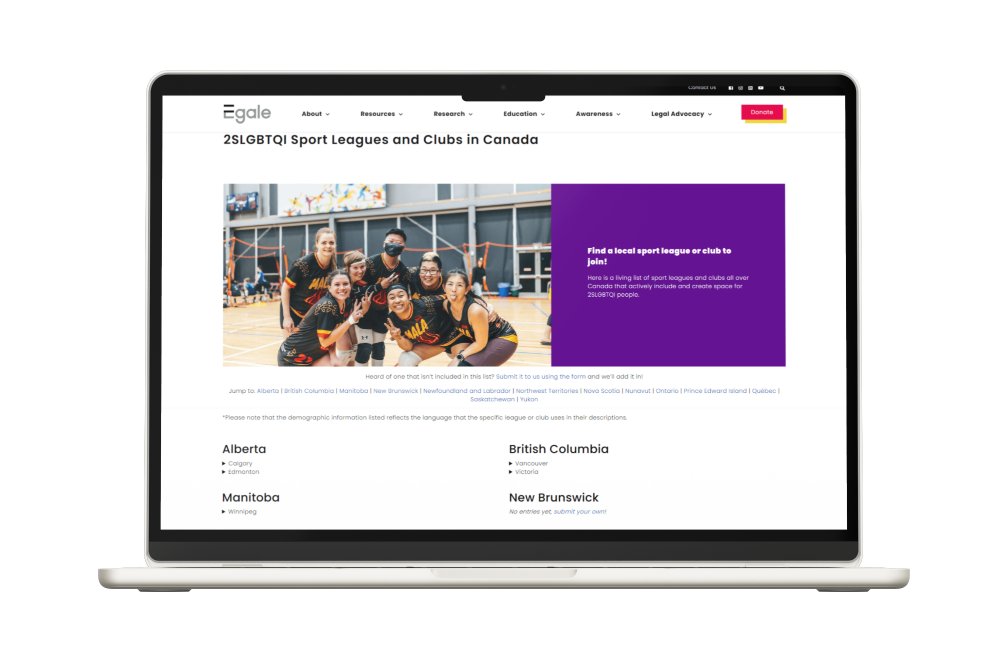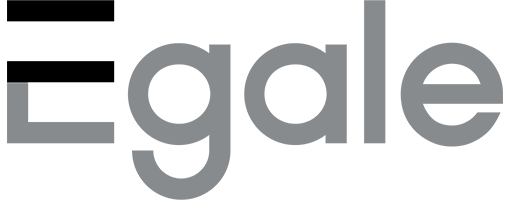
Join Egale Canada and You Can Play in making sport more inclusive for 2SLGBTQI communities.
Jump to: Barriers | Resources | 2SLGBTQI Athletes | Importance of Pride House
As the world comes together for the 2024 Paris Olympics and Paralympics, we have a unique opportunity to celebrate the power of sport to unite and inspire. However, for this unity to be truly inclusive, it must embrace athletes of all genders, identities, and backgrounds.
Historically, 2SLGBTQI people, especially those who are trans, nonbinary, intersex or gender nonconforming, face exclusion in sport. This exclusion is not only a personal loss for individual athletes, but also a loss for the sporting community, which misses out on the diverse talents and perspectives these athletes bring.
Social attitudes toward 2SLGBTQI athletes have become even less supportive over the past three years according to a recent poll by Ipsos, which was conducted in 23 countries including Canada. Support for openly lesbian, gay, and bisexual athletes on sports teams dropped by 11 percentage points in Canada, while support for trans athletes competing in gendered divisions that don’t match the sex they were assigned at birth dropped by 12 percentage points.
Representation and inclusion in elite sport impacts athletes at all levels. Sport offers well-documented benefits like physical health improvements, mental well-being, and social cohesion. This is particularly crucial for 2SLGBTQI individuals, who face higher mental health issues and isolation. Inclusive sport fosters community, belonging, and support, breaking down societal prejudices and promoting cultural diversity.
Inclusion isn’t just about fairness; it’s about recognizing and appreciating the diverse experiences athletes bring. Let’s ensure the 2024 Paris Olympic and Paralympic Games are inclusive, sending a powerful message that every athlete, regardless of gender identity, attraction or level of sport deserves to compete and be celebrated fairly!
Understanding the Barriers to Inclusion
To foster true inclusion, it is important to understand the barriers that 2SLGBTQI athletes and in particular trans, intersex and gender diverse athletes face. These barriers can be categorized into three main areas: physical, administrative, and cultural.
- Physical barriers include inaccessible facilities like buildings, changing rooms, and washrooms, which pose significant challenges for trans individuals participating in sport.
- Administrative barriers arise from registration processes and medical requirements that often do not accommodate nonbinary, intersex or trans identities, creating additional hurdles to participation.
- Cultural barriers involve organizational policies, language use, and attitudes that perpetuate exclusion and transphobia within sport environments.
Learn more about sport inclusion barriers by reading Egale’s Sport Inclusion in Canada Literature Review.

Creating 2SLGBTQI-Inclusive Sport
- Advocate for policies that support the participation of gender diverse athletes in all levels of sport, from local leagues to international competitions.
- Support the development of inclusive facilities and policies within your local sport organizations.
- Sport organizations need to develop and enforce inclusive policies that explicitly prohibit discrimination based on gender identity and sexual orientation. They should ensure that policies are not just in place but are actively implemented.
- Show visible support and community engagement! Highlight and support gender diverse athletes who are competing at the Paris 2024 Olympics and other sporting events. Follow their journeys, celebrate their victories, and stand with them in solidarity.

For comprehensive strategies and further insights on fostering inclusive sport, consult Egale’s Sport Inclusion Playbook.
More Resources for Creating 2SLGBTQI-Inclusive Sport
NEW RESOURCE
2SLGBTQI Sport Leagues and Clubs in Canada
Find a local sport league or club to join! Use our living list of sport leagues and clubs all over Canada that actively include and create space for 2SLGBTQI people. Heard of one that isn’t included in this list? Submit it to us using the form and we’ll add it in!

2SLGBTQI Foundation Resources
Sport Inclusion Resources
The Importance of Pride House
Modeled after traditional Olympic hospitality houses, Pride House provides a welcoming space for 2SLGBTQI athletes, fans, and allies during large-scale international sporting events. It serves as a place to watch competitions, connect with others, educate about 2SLGBTQI issues in sport, and foster relationships with mainstream sport.
With the support of Egale Canada, Pride House was first created during the 2010 Winter Olympics in Vancouver and Whistler, Pride House has since expanded globally. It addresses homophobia and transphobia in sport through education, visibility, and advocacy. Despite challenges, such as the denial of a Pride House in Russia during the 2014 Sochi Winter Olympics, the movement persisted with solidarity events and international support. Its presence at at Paris 2024 will be crucial for several reasons:
- Pride House serves as a beacon of visibility for 2SLGBTQI athletes and supporters, showcasing the diversity and inclusivity of the sporting community. It helps to normalize the presence of 2SLGBTQI individuals in sport and promotes acceptance.
- Pride House offers essential resources, including information on 2SLGBTQI rights, mental health support, and advocacy. It is a hub for education and empowerment, providing tools to combat discrimination.
- By bringing together 2SLGBTQI individuals and allies, Pride House fosters a sense of community and solidarity. It is a place where people can connect, share stories, and build lasting relationships, strengthening the global 2SLGBTQI sport community.

Join Egale Canada and You Can Play in building inclusive sport environments with our many resources designed to support 2SLGBTQI athletes. Together, we can break down barriers and promote a culture of inclusion and respect in sport.


